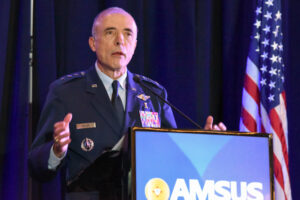Air Force Medical Service leaders presented strategic priorities and critical organizational changes aimed at preparing Air Force medical capabilities for the future during the 2024 AMSUS meeting, Feb. 12 to 15 at the National Harbor, Maryland.
The event enables interagency collaboration, and during the 2024 conference, health care leaders representing all branches of the military offered panel discussions and presentations during 65 sessions. The Society of Federal Health Professionals, an association supporting federal health professionals and their jobs at the Department of Defense, Veterans Affairs, Health and Human Services, and Homeland Security, hosts AMSUS annually. AFMS leaders were key speakers in six sessions during the conference.
During a session on Feb. 13, Maj. Gen. John DeGoes, U.S. Air Force Deputy Surgeon General, and Brig. Gen. John Andrus, Joint Staff Surgeon, spoke on a panel about the importance of data quality in transforming medical readiness. They discussed efforts to create a strategy on how best to use and share data with partners, the challenges in collecting and analyzing data in a deployed setting, using artificial intelligence support for medical technicians in difficult environments, and standardizing data definitions across the services.
“The medical support to great power competition in a more challenging environment needs to have actionable health care data,” said DeGoes.
Later, Col. Tracy Allen, Director, Expeditionary Medical Policy and Operations, and Col. Matthew Hanson, Air Force Medical Agency Deputy Commander, detailed AFMS efforts to prepare for great power competition. Allen and Hanson emphasized the need for organizational changes, the importance of preparing Air Force personnel for deployment, and the role of the Air Force in supporting allies while having a deliberate process to ensure sustainable readiness.
“Our medical capabilities must always be organized, trained and equipped to support a number of distinct Department of Air Force missions,” said Hanson. “We need medics set aside just for the base so that we can keep fighting from the base. We need medics that can generate combat forces. And, we’re going to have deployed combat medics … that will move forward and operate hubs and spokes, and would need to meet combatant commander requirements.”
On Feb. 14. Maj. Gen. Sean Collins, Director, U.S. Space Force Medical Operations, and Col. Lidia Stana Ilcus, Deputy Director, U.S. Space Force Medical Operations, participated in a panel about spaceports and aerospace medical considerations. The session centered on the challenges and opportunities in spaceflight medicine, the difficulties with space surgery, and medical capabilities in space exploration.
“I was asked, ‘will there be GI space medicine?’ And the way I look at it is … there will be people who have GI training, like I have critical care training, who do aerospace medicine and [extra] space medicine training to understand the difference in platforms,” said Ilcus. “But [space medicine as a subspecialty of aerospace medicine] is lunar … that makes it different, and that will require different analysis.”
Stephen Mounts, U.S. Air Force Associate Deputy Surgeon General, and Col. Michael Fea, Department of the Air Force’s Medical Operations deputy director, offered a presentation about AFMED. The two talked about how AFMED, an intermediate management organization within the AFMS, best postures the AFMS for alignment to great power competition. They also discussed how AFMED commanders will be equipped to balance Department of the Air Force medical readiness priorities and Defense Health Agency healthcare delivery requirements at the installation level.
The final presentation on Feb. 14 focused on optimizing Airman and Guardian performance. Brig. Gen. James Parry, Medical Operations acting director, office of the Air Force Surgeon General; Chief Master Sgt. James Woods, Chief, Medical Operations, Medical Operations and Logistics; Col. Amalia Divittorio, Chief, Integrated Operational Support, AFMED; Col. Christian Smith, Air Force Director of Psychological Health; and, Col. Justin Rowberry, Director, Developmental and Behavioral Family Readiness Center, were panelists during the session.
Panelist discussions included the scopes and limitations of Development and Behavioral Family Readiness Centers and how the program is expanding, Mental Health Targeted Care, operational support teams, and opportunities to improve the status of the mental health for members of the organization.
“Over the last 10 years, we see that mental health is being utilized more,” Smith said. He explained that service members used to have a stigma about being seen by mental health providers, however, the military has taken great measures to emphasize the benefits of maintaining mental health. “I think we’re seeing some results there which are positive,” he added.
On the final day of ASMUS, Lt. Gen. Robert Miller, the U.S. Air Force Surgeon General, represented the DAF on a senior leader readiness panel where he discussed AFMS readiness operations and the support it provides to the Space Force.
“The AFMS ensures the medical readiness of the Department of the Air Force, and that [includes] Space Force Guardians and Air Force Airmen,” he said.
Miller described how quickly the Space Force organization is developing and noted how, in the last few years, launches have increased by 300%.
“Space is truly the critical warfighting domain,” said Miller. “That Guardian mission is somewhat unique, and it’s still evolving, and we’re still learning as medics how best to support those Guardians. But it’s clearly a no-fail mission.”
While the AFMS has provided medical support to the Space Force since it was established, the AFMS stood up a Space Force Medical Operations Directorate in March 2023 with a team dedicated to the growing mission.
“The U.S. Air Force medicine department has been supporting space, really, since 1949,” Miller said. “Things are kind of at high speed now, with the push to prepare for great power competition. It’s a pretty exciting time to be in the Department of the Air Force, and Space Force is a big part of that.”

